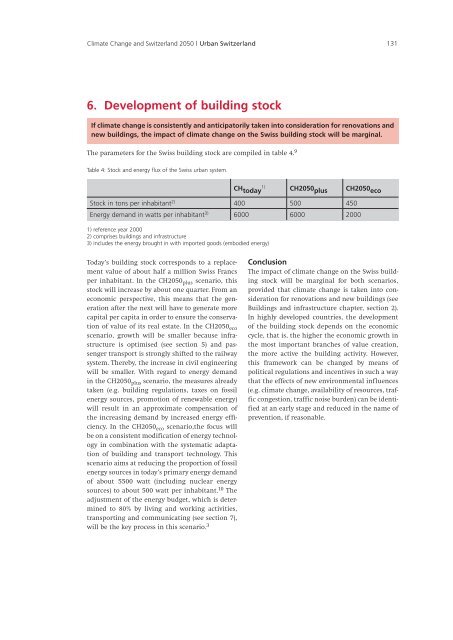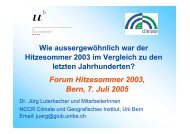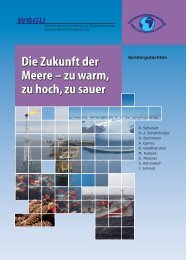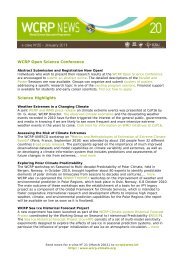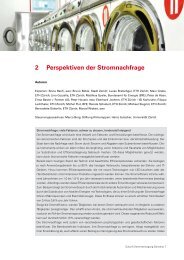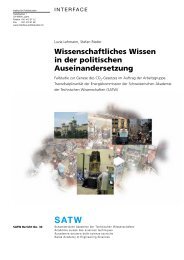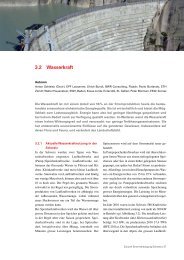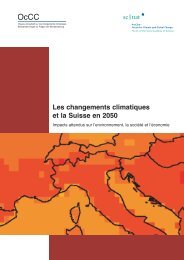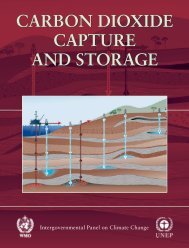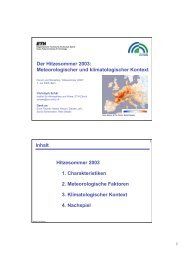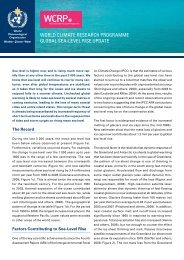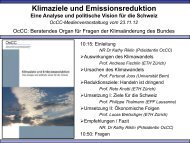Climate Change and Switzerland 2050 - OcCC - SCNAT
Climate Change and Switzerland 2050 - OcCC - SCNAT
Climate Change and Switzerland 2050 - OcCC - SCNAT
Create successful ePaper yourself
Turn your PDF publications into a flip-book with our unique Google optimized e-Paper software.
<strong>Climate</strong> <strong>Change</strong> <strong>and</strong> Switzerl<strong>and</strong> <strong>2050</strong> | Urban Switzerl<strong>and</strong> 131<br />
6. Development of building stock<br />
If climate change is consistently <strong>and</strong> anticipatorily taken into consideration for renovations <strong>and</strong><br />
new buildings, the impact of climate change on the Swiss building stock will be marginal.<br />
The parameters for the Swiss building stock are compiled in table 4. 9<br />
Table 4: Stock <strong>and</strong> energy flux of the Swiss urban system.<br />
Today’s building stock corresponds to a replacement<br />
value of about half a million Swiss Francs<br />
per inhabitant. In the CH<strong>2050</strong> plus scenario, this<br />
stock will increase by about one quarter. From an<br />
economic perspective, this means that the generation<br />
after the next will have to generate more<br />
capital per capita in order to ensure the conservation<br />
of value of its real estate. In the CH<strong>2050</strong> eco<br />
scenario, growth will be smaller because infrastructure<br />
is optimised (see section 5) <strong>and</strong> passenger<br />
transport is strongly shifted to the railway<br />
system. Thereby, the increase in civil engineering<br />
will be smaller. With regard to energy dem<strong>and</strong><br />
in the CH<strong>2050</strong> plus scenario, the measures already<br />
taken (e.g. building regulations, taxes on fossil<br />
energy sources, promotion of renewable energy)<br />
will result in an approximate compensation of<br />
the increasing dem<strong>and</strong> by increased energy efficiency.<br />
In the CH<strong>2050</strong> eco scenario,the focus will<br />
be on a consistent modification of energy technology<br />
in combination with the systematic adaptation<br />
of building <strong>and</strong> transport technology. This<br />
scenario aims at reducing the proportion of fossil<br />
energy sources in today’s primary energy dem<strong>and</strong><br />
of about 5500 watt (including nuclear energy<br />
sources) to about 500 watt per inhabitant. 10 The<br />
adjustment of the energy budget, which is determined<br />
to 80% by living <strong>and</strong> working activities,<br />
transporting <strong>and</strong> communicating (see section 7),<br />
will be the key process in this scenario. 3<br />
CH today 1) CH<strong>2050</strong> plus CH<strong>2050</strong> eco<br />
Stock in tons per inhabitant 2) 400 500 450<br />
Energy dem<strong>and</strong> in watts per inhabitant 3) 6000 6000 2000<br />
1) reference year 2000<br />
2) comprises buildings <strong>and</strong> infrastructure<br />
3) includes the energy brought in with imported goods (embodied energy)<br />
Conclusion<br />
The impact of climate change on the Swiss building<br />
stock will be marginal for both scenarios,<br />
provided that climate change is taken into consideration<br />
for renovations <strong>and</strong> new buildings (see<br />
Buildings <strong>and</strong> infrastructure chapter, section 2).<br />
In highly developed countries, the development<br />
of the building stock depends on the economic<br />
cycle, that is, the higher the economic growth in<br />
the most important branches of value creation,<br />
the more active the building activity. However,<br />
this framework can be changed by means of<br />
political regulations <strong>and</strong> incentives in such a way<br />
that the effects of new environmental influences<br />
(e.g. climate change, availability of resources, traffic<br />
congestion, traffic noise burden) can be identified<br />
at an early stage <strong>and</strong> reduced in the name of<br />
prevention, if reasonable.


